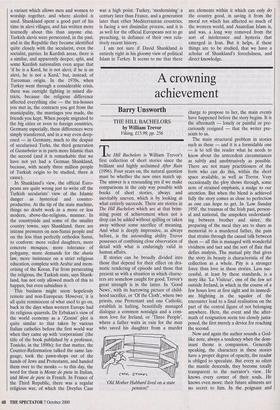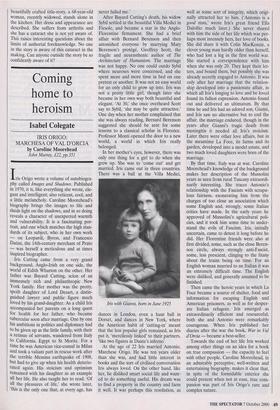A crowning achievement
Barry Unsworth
THE HILL BACHELORS by William Trevor Viking, £15.99, pp. 256 Te Hill Bachelors is William Trevor's first collection of short stories since the brilliant and highly acclaimed After Rain (1996). Four years on, the natural question must be whether the new ones match up. The answer is a resounding yes if we make comparisons in the only way possible with books of short stories, always and inevitably uneven, which is by looking at what entirely succeeds. There are stories in The Hill Bachelors which are at that brim- ming point of achievement when not a drop can be added without spilling or taken away without some sacrifice of meaning. And what is deeply impressive, as always before, is the astounding ability Trevor possesses of combining close observation of detail with what is enduringly valid in human affairs.
If stories can be broadly divided into those that depend for their effect on dra- matic rendering of episode and those that present us with a situation in which charac- ters are somehow caught for good, Trevor's great strength is in the latter. In 'Good News', with its harrowing picture of child- hood sacrifice, or 'Of the Cloth', where two priests, one Protestant and one Catholic, establish in halting, beautifully managed dialogue a common nostalgia and a com- mon love for Ireland, or 'Three People', where a father waits in vain for the man who saved his daughter from a murder `Old Mother Hubbard lived on a state pension!' charge to propose to her, the main events have happened before the story begins. It is the aftermath — lonely or painful or pre- cariously resigned — that the writer pre- sents to us.
The main structural problem in stories such as these — and it is a formidable one — is to tell the reader what he needs to know about the antecedent circumstances as subtly and unobtrusively as possible. There are not many practitioners of the form who can do this, within the short space available, as well as Trevor. Very occasionally the ploy shows through, some note of strained emphasis, a nudge to our attention. But when the blend is achieved fully the story comes as close to perfection as one can hope to get. In 'Low Sunday 1950', the traumas of the Irish past, person- al and national, the unspoken understand- ing between brother and sister, the preparing of the meal they are to share as memorial to a murdered father, the pain that strains through the casual talk between them — all this is managed with wonderful vividness and tact and the sort of flair that defies analysis. The mutual pity that gives the story its beauty is characteristic of the collection as a whole. Pity is a stronger force than love in these stories. Less suc- cessful, at least by these standards, is a story like le Visiteur', one of the few set outside Ireland, in which in the course of a few hours love at first sight and its immedi- ate blighting in the squalor of the encounter lead to a final realisation on the part of the central figure of not belonging anywhere. Here, the event and the after- math of resignation seem too closely juxta- posed, the first merely a device for reaching the second.
Now and again the author sounds a God- like note, always a tendency when the dom- inant theme is compassion. Generally speaking, the characters in these stories have a proper degree of opacity, the reader is obliged to speculate. But every so often the mantle descends, they become totally transparent to the narrator's view. He knows every corner of their souls. He knows even more: their future ailments are no secret to him. In the poignant and beautifully crafted title-story, a 68-year-old woman, recently widowed, stands alone in the kitchen. Her dress and appearance are described. She suffers from arthritis and she has a cataract she is not yet aware of. This raises interesting questions about the limits of authorial foreknowledge. No one in the story is aware of this cataract in the making. Can anyone outside the story be so confidently aware of it?



















































































 Previous page
Previous page